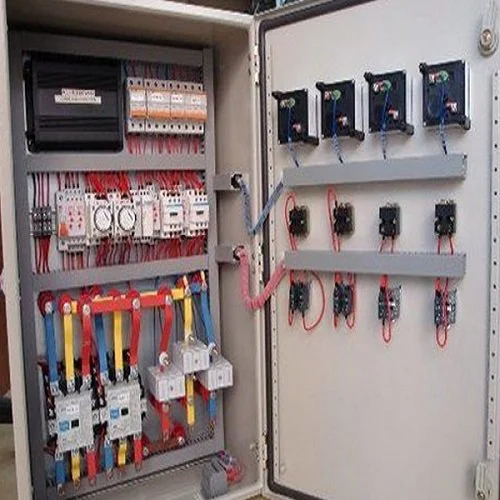RELAY CONTROL PANELS
Relay Control Panels
Relay control panels are essential components in industrial automation and control systems, playing a vital role in managing and safeguarding electrical equipment. These panels utilize electromechanical relays to perform switching operations and control various processes, offering an efficient and reliable method for monitoring and controlling electrical circuits. At the core of a relay control panel is the relay itself, which acts as an electrically operated switch. When a voltage is applied to the relay coil, it generates a magnetic field that closes or opens the circuit contacts, allowing or interrupting the flow of electrical current. This capability enables the control of large electrical loads using low-power control signals, making relay panels a popular choice in many applications.
One of the primary advantages of relay control panels is their versatility. They can be designed to perform a wide range of functions, including starting and stopping motors, controlling lights, managing heating systems, and facilitating communication between various components in an automation system. This adaptability allows engineers to customize relay panels to meet specific operational needs, enhancing the efficiency and effectiveness of the overall system.
Relay control panels can also enhance safety in industrial environments. By incorporating features such as overload protection, short-circuit protection, and emergency stop buttons, these panels help prevent equipment damage and ensure the safety of personnel. For example, in a motor control application, a relay panel can be programmed to detect overload conditions and automatically disconnect the motor to prevent overheating and potential failure. This proactive approach to safety is crucial in minimizing downtime and reducing maintenance costs.
Moreover, modern relay control panels often include advanced features such as timers, sensors, and communication interfaces. Timers allow for precise control over processes, enabling functions such as delayed start or stop sequences. Sensors can provide real-time feedback on operating conditions, allowing the panel to adjust its operation accordingly. Communication interfaces, such as Modbus or Ethernet, facilitate integration with higher-level control systems and enable remote monitoring and control capabilities. This level of sophistication enhances the functionality of relay control panels and supports the growing trend of Industry 4.0, where interconnected systems and data analytics drive operational efficiency.
The design and construction of relay control panels are governed by various standards and regulations to ensure safety and reliability. Organizations such as the National Electrical Manufacturers Association (NEMA) and the International Electrotechnical Commission (IEC) provide guidelines for panel construction, including enclosure ratings, wiring practices, and component selection. Compliance with these standards is critical for ensuring that relay panels can operate safely and effectively in their intended environments.
In terms of installation, relay control panels are typically mounted in dedicated enclosures to protect them from environmental factors such as dust, moisture, and temperature fluctuations. Proper installation is essential for optimal performance, including considerations for wire management, grounding, and ventilation. Once installed, regular maintenance is necessary to ensure the longevity and reliability of the panel. This includes periodic inspections, testing of relay operation, and cleaning of electrical contacts to prevent failure due to corrosion or wear.
As industries continue to evolve, the demand for reliable and efficient control systems is increasing. Relay control panels offer a robust solution for managing complex electrical systems while maintaining safety and efficiency. Their ability to integrate with modern automation technologies and support advanced features makes them a valuable asset in various applications, from manufacturing to HVAC systems. By investing in high-quality relay control panels and ensuring proper installation and maintenance, organizations can achieve enhanced control over their processes, leading to improved productivity and reduced operational risks.
In conclusion, relay control panels are indispensable tools in the realm of industrial automation. Their versatility, safety features, and integration capabilities make them ideal for controlling electrical equipment in a wide array of applications. As technology advances, these panels will continue to play a crucial role in shaping the future of control systems, providing businesses with the tools they need to operate efficiently and safely. By embracing the benefits of relay control panels, industries can ensure their operations remain competitive and responsive to the ever-changing demands of the market.
.jpg)
